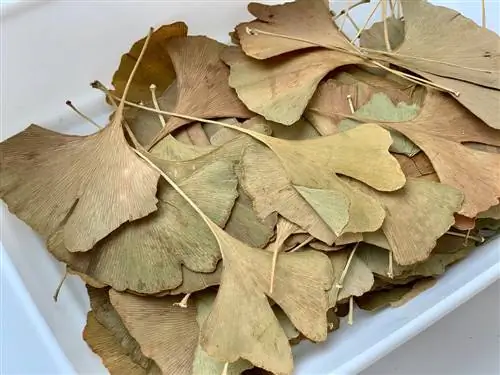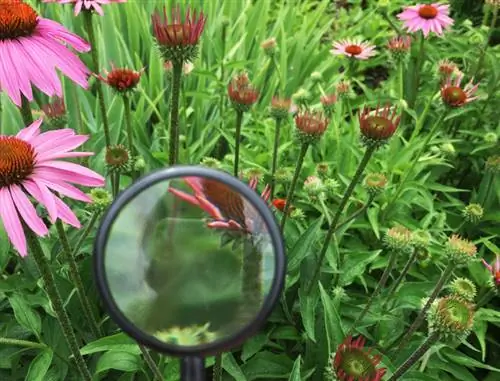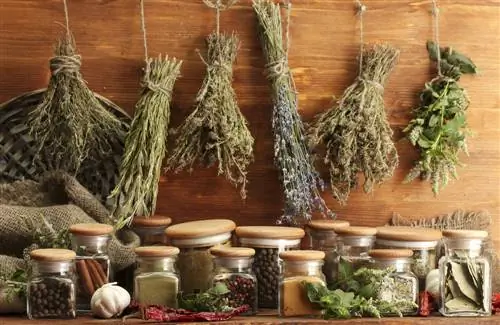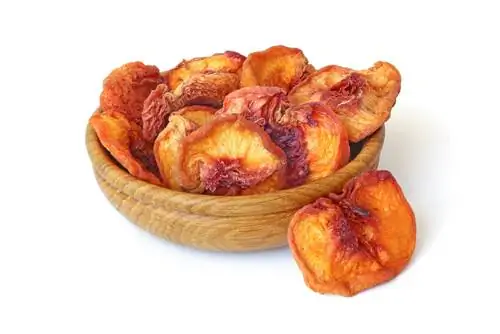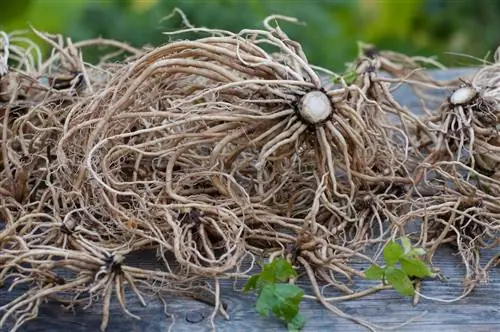- Author admin leonars@hobbygardeners.com.
- Public 2023-12-16 16:46.
- Last modified 2025-01-23 11:22.
The ginkgo tree (Ginkgo biloba) is used in traditional Chinese medicine for various purposes, such as increasing concentration and improving memory. Read how to dry the leaves for ginkgo tea and what you need to pay attention to when drinking tea.
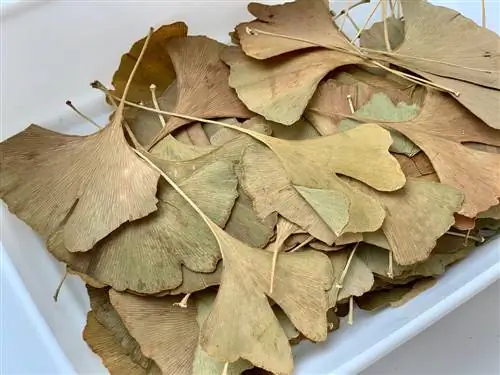
How to dry ginkgo leaves correctly?
To dry ginkgo leaves, harvest young, he althy leaves in spring. Dry the leaves either by pressing them in blotting paper and heavy books or by drying them at 75°C in the oven, dehydrator or in a warm, dark place. Dried leaves last 9 to 12 months.
How to harvest ginkgo leaves for drying?
The best way to harvest the leaves of the ginkgo for drying is as follows:
- select young, fresh leaves
- no leaves with disease symptoms
- no leaves with spots
- no discolored leaves
- no dirty sheets
Pick theleaves including the stemfrom the tree and collect them in a basket or similar container - the leaves should be asairy be kept.
The best time to harvest ginkgo leaves isspring, when the foliage is still young and tender. However, be careful not to harvest leaves from trees on busy roads - these are often contaminated with pollutants.
How to dry ginkgo leaves gently?
There aredifferent ways to dry ginkgo leaves. These depend on what exactly you plan to do with the dried leaves.
- Pressing: You can dry ginkgo leaves in a press or between two thick books. To do this, place the leaves between two layers of blotting paper and put a weight on them. After one to two weeks the leaves will be dry and can be used whole.
- Drying: If you just want to dry the ginkgo leaves, but preserving the shape and color is not that important to you, you can dry them at 75 °C in the oven, in a dehydrator or in the air in a dark place and dry in a warm place.
How long do dried ginkgo leaves last?
If you store them properly, once dried, ginkgo leaves will last aboutnine to twelve months. To do this, you should remove them as follows:
- fill into a well-sealable container, e.g. B. a screw-top jar
- Glass containers should be dark as light destroys the ingredients
- dry, cool and dark place
In addition, you should not remove the leaves with your bare hands, but use a clean spoon or something similar. This means that neither dirt nor putrefactive bacteria or germs get in and infect the remaining leaves. Before each removal, you should also take aodor sample: If the ginkgo leaves smell musty, they should be thrown away.
What can you do with dried ginkgo leaves?
Traditionally, dried ginkgo is used as a tea leaf in its country of origin, China. Ginkgo tea is said to have many he alth-promoting properties. And this is how you prepare it:
- Mash dried ginkgo leaves
- Use a teaspoon of crushed ginkgo leaves per cup
- pour boiling water on top
- approx. Let it steep for five to six minutes
Due to its characteristic shape, the ginkgo leaf is also often used forcrafting and designing. To do this, you need to press the sheet as it dries, as described in the question above.
Can I freeze ginkgo leaves instead of drying them?
If you wanted to brew a tea from the collected ginkgo leaves, you should dry them first. In principle, you can also make tea from thefresh or frozenleaves of the ginkgo. The disadvantage of freezing, however, is that it requireshigh energy expenditure over a longer period of time - drying the leaves and storing them in this way, however, does not cost any energy and is therefore better for the climate and the environment.
Tip
Enjoy ginkgo tea only in moderation
However, many doctors and other experts advise against drinking ginkgo tea regularly or in large quantities. The tea contains ginkgolic acid, which can trigger allergies and cause discomfort, including diarrhea and vomiting. Pregnant women, breastfeeding women and people who take blood-thinning medication are even completely prohibited from consumption.

